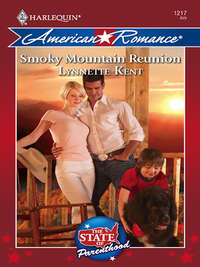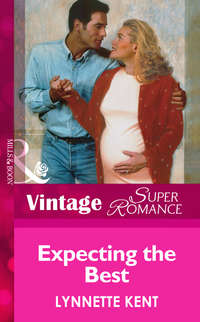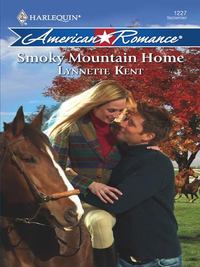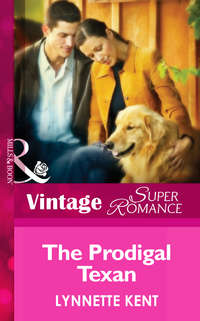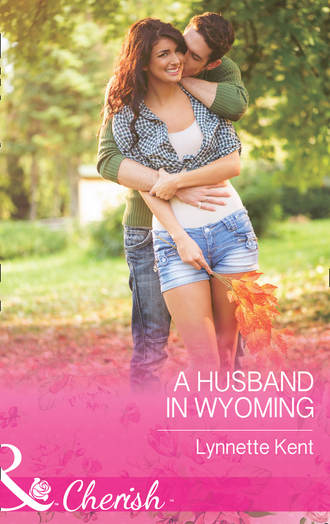
Полная версия
A Husband In Wyoming
“My turn.” A bulkier boy stepped up to the barrel. Thomas gave him a dirty look but backed out of the way, dusting his hands off on the seat of his jeans.
“Marcos Oxendine,” Dylan told Jess. “One of our more challenging kids.”
But today Marcos seemed to be on his best behavior. Grinning, he climbed onto the barrel, wrapped the rope around his gloved hand and yelled, “Let’s go! Aiyee!”
The kids on the four corners began pulling their ropes, causing the barrel to tilt and sway in all different directions. Their encouraging shouts rang out in the afternoon air, recalling the roar of the grandstand crowd at a real rodeo. Marcos stayed on for nearly eight seconds, using his upper body to counter the motion of the drum he rode. When he finally did come off, he sat up laughing, while the spectators around him applauded.
“Again!” he demanded. “I’m doin’ it again!”
Dylan glanced at the reporter beside him to gauge her reaction. What he noticed was that she stood with her hands in the back pockets of her jeans, and the stance did great things for her figure. He shifted his weight, cleared his throat and refocused his attention on the kids.
Marcos’s second ride didn’t last as long, but he moved away agreeably enough when Lena Smith marched up and announced that she wanted to go next.
Jess turned to Dylan with a shocked expression. “These events allow women to compete?”
“Yes, and there are a couple of women out there today riding against men. Lena is interested, so we wanted to give her a chance. And she’s actually pretty good.”
The girl proved his words, staying on for a full eight seconds, though Dylan suspected the rope pullers were going a little easy on her.
Still, she grinned when she got down. “That is so cool.”
Beside Dylan, Jess Granger shook her head. “This was not what I pictured when you said you were conducting a summer camp. I thought, you know, arts and crafts—collages made with pinecones and sticks they pick up on a hike.”
“Nope. We’ve been working on their riding skills—none of them could sit on a horse when they showed up here. On Friday we’re taking them on their first cattle drive. You’ll have to come along and observe.”
“Um... I’m another one who’s never been on a horse before I got here.”
He gave her a wink. “We might have to work on that.”
“By Friday?”
“There’s a full moon tonight.”
“That sounds like a threat.”
“Could be. In the meantime, come meet my brother Ford and his fiancée.”
Introductions took place as the kids dispersed, the boys heading to their bunkhouse and the three girls to the cabin they shared with Caroline. “They get an hour or so to reconnect with their phones,” Caroline explained to Jess. “We wouldn’t want anybody going into withdrawal.”
“I certainly would, without mine. Dylan said that these are some of the troubled kids in your area.”
“That’s right. Most of them have had some kind of run-in with the legal system.”
“They seem pretty cooperative, overall. Not as resistant as I would expect.”
“Today’s a successful day,” Ford said. Caroline nodded. “And we’ve been together for a few weeks, developed some relationships. Do you have experience working with teenagers?”
“No, not really. But I have known some kids with problems.” Jess Granger gave a short laugh. “In fact, I guess you could say I was one. I grew up bouncing in and out of the foster care system. At about the same rate my parents jumped in and out of jail.”
Dylan swallowed hard, unsure of what to say. The Marshall brothers had lost both their parents before Wyatt turned sixteen, but they’d always had each other to depend on. He didn’t want to consider how hard life might be without some kind of family you could trust to take care of you.
After a few seconds of silence, Ford found the right words. “You’ve obviously not only survived that experience, but thrived.”
Caroline put a hand on the journalist’s arm. “I would love to have you talk to our kids, especially the girls. You’re such a great example of what responsibility and persistence can accomplish. Please say you’ll spend some time with them while you’re here.”
Jess Granger looked surprised. “If you think it will help, I’d be glad to.”
“You have to be careful around Caroline.” Ford put his arm around his fiancée and squeezed her shoulders. “If she can find a way to use you in one of her causes, she will. That’s how the Circle M ended up hosting this camp in the first place.”
“The world needs people who push for ways to help others,” Jess said. “They’re the ones who make a difference.” She turned to Dylan, still speechless beside her. “Would this be a good opportunity for the two of us to talk? I was hoping to see your studio, get some insight into your new work process.”
He had plenty of reservations about that plan, but no valid reason to refuse. “Sure.” To Caroline and Ford, he said, “We’ll catch up with you two at dinner.”
Then, with a sense of dread, he headed toward the studio, leading the enemy directly into the heart of his most personal territory.
* * *
JESS CAUGHT UP with Dylan as he angled away from the ranch house, across a downhill stretch of grass toward what seemed to be another barn, though this building was gray, not red like the one at the top. “You haven’t said anything.”
His handsome face was hard to read. “I admire your achievements, against such odds. Were you close to your foster family?”
“Which one?” She wanted to push his buttons, shake his self-control. “I lived with five different couples. Ten brothers and sisters. Not all at once, of course.”
“That sounds pretty tough.” They reached the corner of the building but he continued past it, toward a stand of trees where the land flattened out. The grass was longer here and greener than on the hill, bending and swaying in the ever-present wind.
Jess stopped to take some pictures, and had to catch up with him again. “Where are we going?”
“To the creek.”
“Why?”
“You wanted to understand my process.”
They stepped under the shade of the trees and the temperature dropped about ten degrees. Jess removed her hat to let the breeze cool her head. “That feels so good.”
Dylan nodded. “Part of the process.”
He’d taken his hat off, too, letting the wind blow his wavy hair back from his face. There was a straight line across his forehead where the dirt from his morning’s work had streaked his skin below his hat. It looked funny, yet also appealing, since it spoke of the physical effort he’d made. Jess was suddenly aware of his bare forearms, his flat stomach and tight rear end. Taking a deep breath, she pivoted away to study the scenery.
Trees and shrubs grew right up to the edge of the water. Along the edge of the stream, the trees were interspersed with rocks and boulders, some as big as cars. The creek bed itself was covered with smaller rocks and stones, which created a sparkling music as the water flowed over them.
“Beautiful,” she said, snapping more photographs, moving around to get different angles and light levels. “Like visiting a national park somewhere, but it’s all yours. No noisy, nosy tourists traipsing around to spoil it.” She grinned at Dylan. “Unless you count me.”
“You’re definitely nosy. Not too noisy, so far.” He gestured to the big, level rock he stood beside. “Come sit down.”
“Okay.” She sat on the rock and he joined her, leaving a space between them. Shadows from the leaves above danced across them, a flicker of gold and gray on their faces. “Now what?”
“Be still for a few minutes. Listen.”
Being still wasn’t Jess’s habit. Most of the time when she was sitting down, her fingers were flying over the keyboard, typing an article or doing research on the internet. Now, with nothing to do, she had to grip her hands together to keep them off her camera—there were several terrific shots she could get from this position, including some close-ups of Dylan himself. Profiled against the trees, he radiated a calm control that was the essence of the cowboy ideal.
An essence very different from the frenetic artist he’d appeared to be three years ago. What had changed him? Or perhaps the question was, what had driven him in the first place? How did a boy who’d grown up in this setting, with the kind of values his brothers clearly considered important, end up in the limelight of the contemporary art scene? How would his work be different now? Was he ready to step back onto the international stage? Or did he have a different plan?
Would he answer her questions honestly, or leave her to draw her own conclusions? How well could she get to know him before she had to leave?
Dylan turned his head to look at her. “What do you think?”
“I think I’m dying to see your studio.”
He glared at her with narrowed eyes. “Are you ever distracted?”
“Not if I want to keep my job.”
“Does your job depend on my article?”
Jess shrugged. “I’m as useful to the magazine as my latest work. And there are lots of hungry writers out there hoping for a break. I’m the only support I’ve got, so staying employed is kind of a high priority.”
After a long moment of stillness, Dylan sighed and got to his feet. “Well, then, Ms. Granger, I guess we’d better get down to business.”
Chapter Two
The door to the barn was blue, in contrast to the weathered gray boards of the exterior, with a full panel of glass panes. Dylan walked inside, then faced Jess and held out an arm. “Be my guest.”
Cool air greeted her as she stepped over the threshold. “Air-conditioning?”
“Wood stays more stable at a constant temperature.”
The scent hit her all at once, a combination of varnish and glue and trees that cleared her sinuses. “It must make you drunk to spend time in here. That’s a powerful room deodorizer.”
He grinned. “I guess that’s why the hours go by so fast when I’m working. I’m always a little high.”
“So this used to be a regular barn?” The space was huge, open from wall to wall and clear to the ceiling, except for the supporting posts. A staircase in the corner led up to a railed loft stretching halfway across, where she could see a bed and a couple of chairs. “You sleep here, too?”
Dylan shrugged. “I remodeled over the years after we moved out here—with help from my brothers, of course. It’s convenient not to walk out into a snowstorm in the middle of the night when I’m falling asleep.” Then he hunched his shoulders again, and grimaced. “You know, I really would like to take a shower. Why don’t you look around the place while I do that? Then we can talk some before dinner.”
“Great.” Jess watched him jog up the steps, then turned to survey the workshop around her. Tables of various sizes, most hand-built of unfinished boards, filled the space. Dylan’s work area appeared to occupy the center of the room, where hand tools lay neatly arranged by size and use—saws, chisels, screwdrivers and other arcane devices she’d didn’t recognize. Several surfaces held pieces of wood, also organized by size, from the smallest chips to branches four feet long. Some tables held sticks and limbs that had been sanded, stained and finished to a smooth shine. They were beautiful elements, but not the kind of material Dylan Marshall had utilized in his popular, critically approved sculptures.
What had he been up to?
For an answer, she moved to the tables lining the walls of the barn, which held figures of varying sizes—from a slender, twelve-inch form to a massive piece at least four feet square.
“Oh, my God,” she said, in shock. “What in the world has he done?”
She recognized the animal she was staring at as a buffalo, about two feet long and not quite as tall. A collection of sticks and branches had been fitted together to create the figure, each curve and hollow of the body being defined by a curve or hollow in the wood. Every piece had been separately finished and polished to a deep sheen, allowing all the natural variations in color and grain to contribute to the texture of the image as a whole.
“Amazing.”
She moved to the next sculpture, a fish twisting up out of a river. The scales of the fish’s skin, the lines of the body and the base of splashing water had all been created with the same technique, fitting hundreds of tiny sticks together to produce a unified whole.
Jess ran a finger along the fish’s spine. “Incredible detail.”
On the next table there was a stalking wolf, almost half life-size, and a rabbit stretched out at a run, both executed with enormous visual talent and technical precision. Walking around the room, she appreciated the many hours Dylan had poured into these sculptures. That bear she’d seen in the living room at the house had been an early prediction of this full-blown talent. No doubt there would be many buyers for these beautiful works of art.
But... She covered her eyes with her shaking fingers.
The response of the art world Dylan had once conquered would be scathing. Cruel. Because of who he’d been and what he’d done, when the critics evaluated these pieces, they would laugh. Then attack.
And her article, the one Trevor Galleries had sponsored as a comeback announcement, would be the call to arms.
Jess dropped her hands to her sides and shook her head. “Artistic suicide.”
Why would Patricia Trevor, the owner of the gallery, choose this kind of work to exhibit? Her showrooms were known for presenting avant-garde, cutting-edge art. Surely Dylan was aware of that. Why would he expose himself to ridicule this way?
From the loft above, she heard the shower cut off. He would be coming down soon, wanting to get her reaction to his pieces. Expecting her to appreciate his output of the past two years.
She needed some time to frame a response. Panicked, Jess ducked under the loft and headed for the shadows along the rear wall of the barn. One of the tables she passed held small clay figures, probably models he’d made as he planned the larger wooden pieces. The entire surface of another table was stacked high with books—anatomy manuals, collections of wildlife photographs, volumes on working with wood, finishes and stains.
The table in the corner under the stairs was illuminated by a large hanging light and covered with sheets of paper. These were his sketches, Jess realized as she came closer, three-dimensional drawings of animals in different poses, from different angles. Some of the studies she recognized from the sculptures she’d already viewed, but not all. He clearly had ideas for more work.
Footsteps sounded on the floor above her. “Be down in a couple of minutes,” Dylan called. “Just making myself presentable.”
“No problem,” Jess said loudly. “Take your time.” She’d inadvertently glanced up as she spoke, but as she brought her gaze down again, a picture on the wall behind the drawing table caught her attention. She hadn’t noticed any other hanging art in the studio, so this one must be important.
The drawing was deceptively simple—a woman with a baby in her lap. Looking from behind the woman, over her shoulder, the viewer could see the very young child with its feet tucked against the mother’s belly, its head resting on her knees and its tiny hands curled around her two middle fingers.
It’s a boy, Jess decided. Something about the baby’s face convinced her of that fact. The delicate lines and shadings were so persuasive, so filled with emotion, she felt as if she was indeed standing in that room, visiting with mother and child. She could almost hear the woman’s voice, singing a nonsense song, and her son’s infant gurgle in response.
Suddenly, Dylan spoke from right behind her. “What in the world are you doing back here?”
* * *
JESS GRANGER WHIRLED to face him, her mouth and eyes wide with surprise. “I didn’t hear you come down.”
He hadn’t expected her to get this far into the studio. No one but him came into this space. “I can be sneaky. There’s nothing important here in the dark under the stairs.”
“Except for this wonderful sketch.” She nodded toward the frame on the wall. “Is it yours?”
“No.” Dylan pulled together a bunch of the papers spread over his drawing table and started to straighten them. He shouldn’t be such a slob, especially with nosy reporters showing up to investigate.
She wouldn’t let the subject drop. “It’s not signed. Did you know the artist? Have they done other work?”
How was he going to get out of this? “We’re here to talk about sculpture, right?”
“Right, but—” She gasped and then leaned over to pick up one of the papers on the table. “What’s this?”
He saw the sketch and swore silently. “Not much. Just an...idea I was playing with.”
When he reached for the sheet, she held it away from him. “This is your brother. Wyatt, right?”
“At least you recognize him.” He wasn’t sure how to get the drawing away from her, short of wrestling her to the floor.
And now she was in full journalist mode. “Are you working on this as a sculpture?”
“Just considering it.”
“You haven’t started. Why not?”
“What did you think of the stuff that’s done?” Dylan said desperately. “Isn’t that what you’re here to write about?”
“It is.” She blew out a breath and put the sketch on the table. “But you won’t want to talk about that, either.” Stepping around him, she went toward the main part of the studio. Dylan followed, as prepared as he could be for what lay head.
“These are fantastic sculptures,” she said, walking along the line of display tables to survey the various pieces. “Lovely representations of the wildlife you obviously value.”
“But?”
“But, Dylan, this is nothing like the abstract work you were doing in college and afterward—the cerebral, confrontational pieces that got you noticed. You know as well as I do, the art that gets talked about isn’t a reproduction of reality. Nobody on the international art scene will be interested in a statue of a buffalo.”
Truth, with a vengeance. He shrugged. “That’s not my problem. This is what I came home to do. I won’t apologize for it.”
“I wouldn’t expect you to. The question is, what am I doing here? Any article I write about your new style is going to bring down catastrophe on your head.” She paused for a moment. “And mine, for that matter. My editor will not appreciate a neat-and-tidy piece about a wildlife artist. It’s just not what Renown readers expect.”
“I can understand that.” He stroked a hand over the head of a fox on the table near him. “So cancel the article.” That would mean she had no reason to stay, of course. He didn’t acknowledge the sense of loss that realization stirred inside him.
But Jess was shaking her head. “Magazine issues are planned long in advance. I’ve got a certain amount of space in this issue. I have to write an article. And after my last assignment...well, I need to turn in good copy.”
“What happened?”
She gave a dismissive wave. “I showed up to interview the next country music legend and found him having an alcohol-fueled meltdown. Smashing guitars, punching walls, throwing furniture. I waited two days for him to sober up. But then all he wanted to do was get me into bed. My editor was not happy. I need to revive my career with this piece.”
“No pressure there.” Now he felt responsible to help her keep her job.
“Exactly. Anyway, Trevor Galleries paid for ad space because we were doing an article on you. It’s a complicated relationship, advertising and content.” She continued walking, examining his work.
“No,” she said, finally, “you won’t be coming back to the contemporary art scene. Not with these sculptures. I’m going to have to find some way to slant this, make it work for my editor. I’ll have to find another hook.” She stared at him with a worried frown. “Any ideas?”
From being the subject—victim—he’d become a coconspirator. “All I can do is talk about what I know.” He couldn’t believe he was giving her a reason to stay, offering to expose himself like this. “Try to explain the changes I’ve made, the reasons I focus on wildlife now.” Not everything, of course. Some secrets weren’t meant to be revealed. Ever.
She didn’t seem to be convinced. “That might work. The ‘soul of an artist’ kind of thing. But you have to be honest and open with me. I can’t turn in a bunch of clichés. Not if I plan to keep my job.”
“Got it.” He would be spilling his guts so Jess Granger could remain employed. That was not at all what he’d planned to do with this interview. There would have to be some kind of payback. “But I want something in exchange.”
“And what would that be?”
“The same access. To you.”
Her hazel gaze went wary. “You’re not writing an article.”
“If I have to drop my defenses, you should, too.”
“I don’t have any defenses.”
“Right. No problems at all with the foster care issue.” Her cheeks flushed. He stared at her until she looked away. “Deal?”
A long silence stretched between them. “Okay. Deal.” She pulled in a deep breath. “So tell me something I can use. Something about your abstract work. What were you thinking when you created those pieces?”
Dylan propped his hip on the corner of the table under the fox and drew a deep breath of his own. “Okay. My second semester in college, I took a sculpture class with Mark Thibault. You know him?”
“Sure. He’s a well-respected critic in contemporary art. He introduced you to the scene. ‘The biggest talent I’ve come across’ was the quote, I believe.”
“Yeah, well. Mark exaggerates. Anyway, he challenged me to explore abstraction. No figures, no representative stuff. If I submitted that kind of project, he promised to fail me for the semester.”
“You cared about grades? Artists are usually rebels in that respect.”
He chuckled. “I had three older brothers who were paying, in one way or another, for that class. I owed them good grades. So I worked my butt off for Mark, but he was never satisfied. He kept criticizing, rejecting, pushing me harder and harder. The deadline was approaching for the final project, and I still didn’t have a passing grade.”
Her hands went into her back pockets. “What happened?”
Dylan gazed up at the ceiling he and his brothers had insulated and paneled with finished boards. “I was sitting in the dorm with some friends, drinking beer out of cans. As guys do, we’d squash the cans when we emptied them and pile them on the table.” He cleared his throat. “In my intoxicated state, I started studying the cans, the shapes of them after they’d been deformed. I chose three that seemed interesting and worked on sketches, playing with their relationships to each other. When I sobered up, I figured out how to make forms using rusted oil drums and a hammer, filled them with concrete and then ripped parts of the drums off.”
Jess was grinning. “And Mark loved it.”
“Oh, yeah. I did, too—it was great to work on a larger scale, to physically manipulate such harsh materials. I felt like I’d opened a door and found a wild new world.”
“Did Mark learn the source of your inspiration?”
“After that sculpture won a blue ribbon, I confessed. He just said, ‘Whatever works, son. Whatever works for you.’”
She gave another of those rich, deep laughs of hers. “And an art prodigy is born.”
“There you go.” He glanced at the window and saw with surprise how long the shadows from the trees had grown. “We’re going to miss dinner if we don’t head for the house.”
“Dinner sounds terrific.” She brought her hands out of her pockets, relaxing the pose that distracted him. “Something about all this fresh air makes me hungrier than usual.”
“Wyoming affects people that way.” He opened the door for her to walk through. “But afterward,” he warned her as they walked up the hill, “it will be your turn to bare your soul.”
* * *
WHEN SHE AND DYLAN entered the house, Jess saw all the Marshall brothers in the same room for the first time. Four handsome cowboys, cleaned up and smiling at her, was enough to set her heart to pounding.


